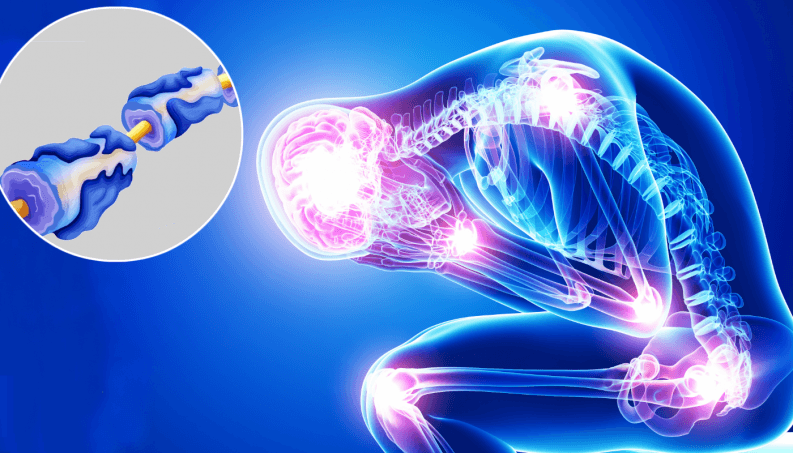COVID-19 Clinical Updates: First It Was COVID-19 Patients Developing Guillain-Barr Syndrome, Now Acute Polyradiculoneuritis As A Clinical Manifestation Emerging
Source: COVID-19 Clinical Updates May 06, 2020 5 years, 7 months, 6 days, 21 hours, 46 minutes ago
COVID-19 Clinical Updates: In mid-April, medical researchers from Italy firtst reported of the phenomenon of COVID-19 patients developing Guillain–Barré syndrome in which they exhibited lower-limb weakness and paresthesia, facial diplegia and ataxia.
https://www.nejm.org/doi/full/10.1056/NEJMc2009191
Since then more such cases involving COVID-19 patients devloping
Guillain–Barré syndrome have been reported all over the world.

GBS or Guillain–Barré syndrome is a rapid-onset muscle weakness caused by the immune system damaging the peripheral nervous system. The initial symptoms are typically changes in sensation or pain along with muscle weakness, beginning in the feet and hands, often spreading to the arms and upper body, with both sides being involved. The symptoms may develop over hours to a few weeks. During the acute phase, the disorder can be life-threatening, with about 15 percent of people developing weakness of the breathing muscles and, therefore, requiring mechanical ventilation. Some are affected by changes in the function of the autonomic nervous system, which can lead to dangerous abnormalities in heart rate and blood pressure.
Although the cause is unknown, the underlying mechanism involves an autoimmune disorder in which the body's immune system mistakenly attacks the peripheral nerves and damages their myelin insulation. Sometimes this immune dysfunction is triggered by an infection or, less commonly by surgery and rarely by vaccination. The diagnosis is usually made based on the signs and symptoms, through the exclusion of alternative causes, and supported by tests such as nerve conduction studies and examination of the cerebrospinal fluid. There is a number of subtypes based on the areas of weakness, results of nerve conduction studies and the presence of certain antibodies. It is classified as an acute polyneuropathy.
Now German medical researchers from Klinikum Ingolstadt hospital have come across a case of a COVID-19 patient who had developed Acute Polyradiculoneuritis, a more chronic form of GBS.
https://www.researchsquare.com/article/rs-26238/v1
A Call For Help! Please help support to sustain this website and all our efforts to propel further research and also various international community projects by making a donation. Donations are accepted via paypal. https://www.thailandmedical.news/p/sponsorship
Acute polyradiculoneuritis
;is severe form of GBS and involved inflammation that develops suddenly when the body's immune system attacks the nerves. It results in generalized weakness and paralysis and the autoimmune inflammation usually affects the motor nerves, resulting in weakness that may progress to complete paralysis.
Interestingly acute polyradiculoneuritis normally manifest in canines (dogs) and is often triggered by infections with various pathogens especially various types of animal coronaviruses.
In the case reported by German medical experts, the 51 year old male patient with COVID-19 exhibited progressive upper and lower limb weakness and akral paresthesias.
On admission, a low dose chest CT scan upon revealed typical bilateral interstitial infiltrates in keeping with Covid-19 pneumonia.
CSF or Cerebrospinal fluid testing revealed mild pleocytosis (9 cells/μl), normal protein content and negative PCR testing for SARS-CoV-2.
Electroneurography demonstrated prolonged distal motor latencies and loss of F waves suggesting peripheral demyelination.
As a result of rapidly deteriorating pulmonary gas exchange the patient needed endotracheal intubation on day two after admission.
Even with treatment with intravenous immunoglobulins (IVIG, 30g daily for 5 days starting upon admission) the neurological status deteriorated to an almost complete peripheral locked-in syndrome with tetraplegia, complete sensational loss in all extremities, bilateral facial and hypoglossal paresis as well as ongoing respiratory failure due to muscular weakness.
The clinical diagnosis of acute polyradiculoneuritis, most likely resembling GBS, was confirmed by spinal MRI.
As with GBS, such similar cases of patients exhibiting symptoms associated with acute polyradiculoneuritis are being reported worldwide.
The medical researchers conclude that GBS may be a relevant complication of COVID-19. Clinicians in general and neurologists in special should be alerted and therapies such as intravenous immunoglobulins and plasma exchange evaluated in such specific settings.
For more on latest
COVID-19 Clinical Updates, keep logging to Thailand Medical News.
A Call For Help! Please help support to sustain this website and all our efforts to propel further research and also various international community projects by making a donation. Donations are accepted via paypal. https://www.thailandmedical.news/p/sponsorship
